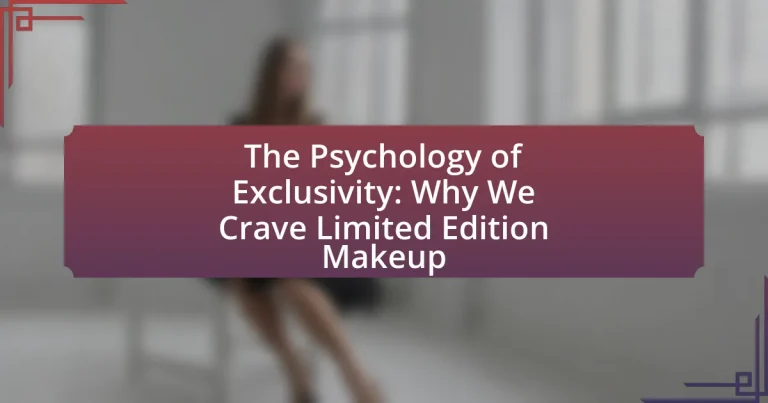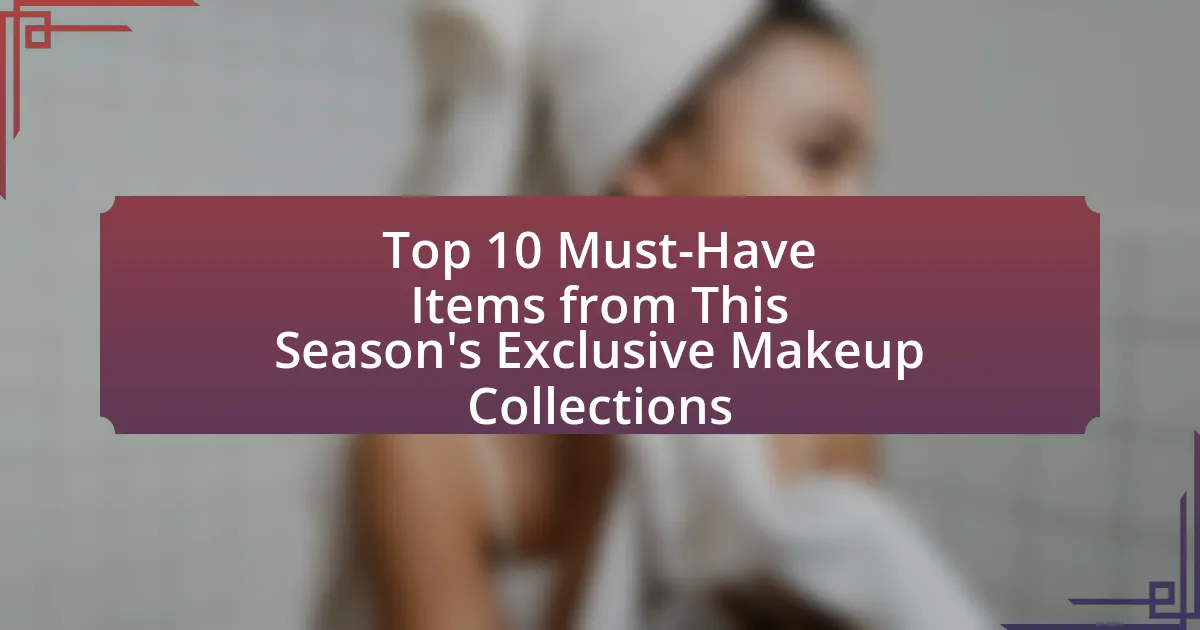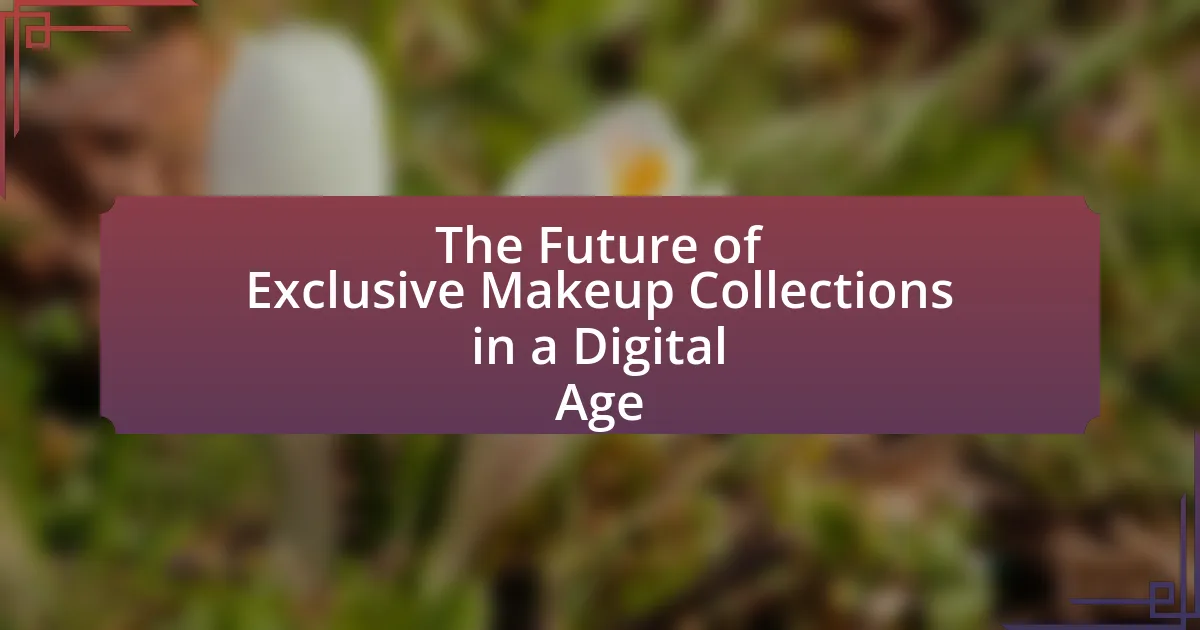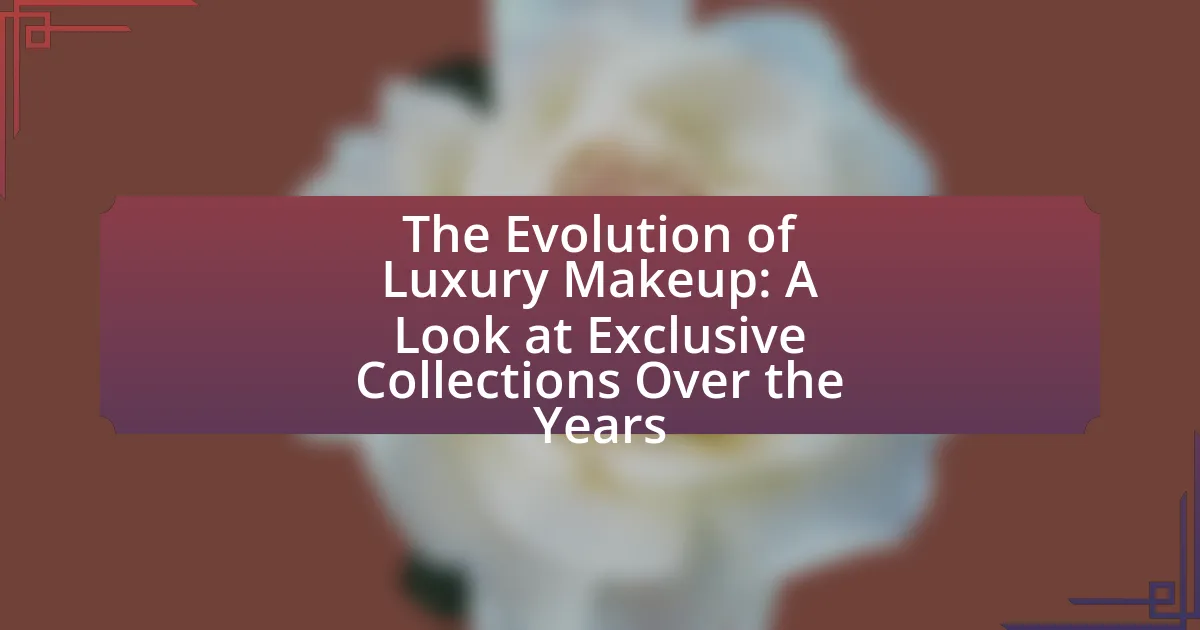The article explores the psychology of exclusivity in the makeup industry, focusing on how limited edition products trigger emotional and cognitive responses among consumers. It examines the principles of scarcity and social proof, highlighting how these factors enhance perceived value and desirability. Key topics include the psychological drivers behind the craving for exclusivity, the influence of social status, and the impact of scarcity on consumer behavior. Additionally, the article discusses marketing strategies that leverage exclusivity, the emotional responses associated with purchasing exclusive makeup, and best practices for consumers to make informed decisions while avoiding impulse buying.
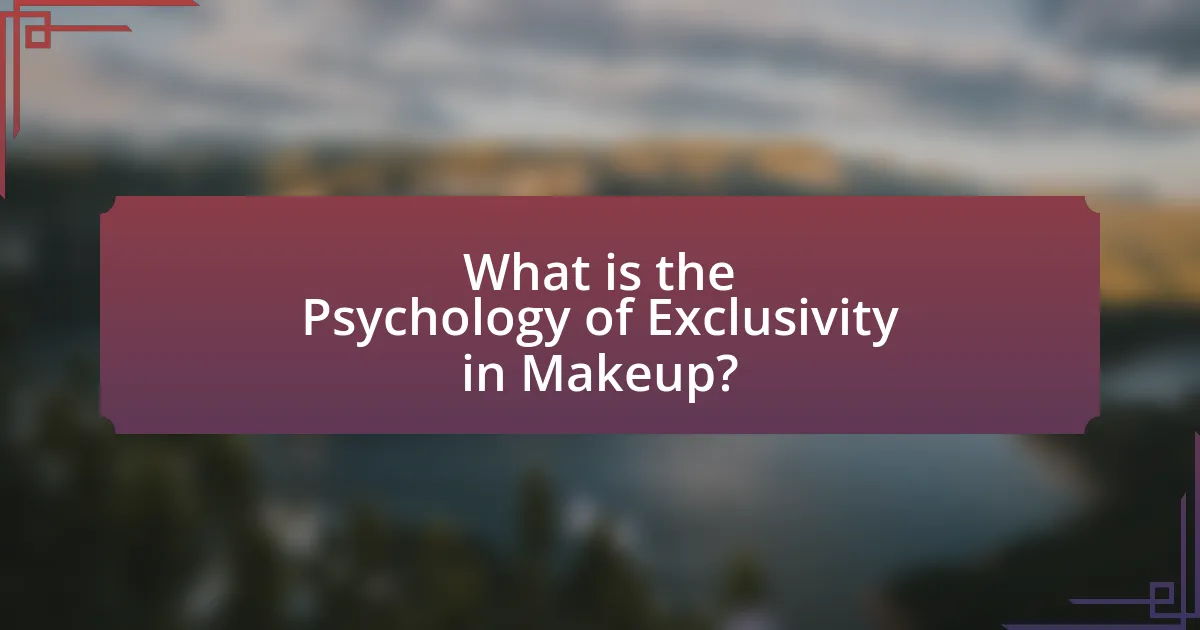
What is the Psychology of Exclusivity in Makeup?
The psychology of exclusivity in makeup refers to the emotional and cognitive responses triggered by limited availability and unique offerings in cosmetic products. This phenomenon is rooted in the principles of scarcity and social proof, where consumers perceive exclusive makeup items as more desirable due to their limited nature. Research indicates that scarcity can enhance perceived value; for instance, a study published in the Journal of Consumer Research found that consumers are more likely to desire products that are presented as scarce or limited edition, as they associate these items with higher status and uniqueness. This desire is further amplified by social influences, where owning exclusive makeup can signal social status and belonging to a particular group, reinforcing the allure of exclusivity in the beauty industry.
Why do consumers desire limited edition makeup products?
Consumers desire limited edition makeup products primarily due to the perception of exclusivity and scarcity. This desire is driven by psychological factors such as the fear of missing out (FOMO) and the belief that owning unique items enhances social status. Research indicates that limited availability can increase the perceived value of a product, making it more desirable; for instance, a study published in the Journal of Consumer Research found that consumers are willing to pay more for items that are marketed as scarce. Additionally, limited edition products often feature unique packaging or formulations, further appealing to consumers’ desire for individuality and self-expression.
What psychological factors drive the craving for exclusivity?
The craving for exclusivity is primarily driven by psychological factors such as social status, scarcity, and the desire for uniqueness. Social status influences individuals to seek exclusive items as a means of signaling wealth or prestige, which is supported by research indicating that people often associate exclusivity with higher value and desirability. Scarcity creates a sense of urgency and enhances the perceived value of an item, as demonstrated by studies showing that limited availability increases consumer demand. Additionally, the desire for uniqueness motivates individuals to differentiate themselves from others, leading them to pursue exclusive products that reflect their personal identity. This interplay of social status, scarcity, and uniqueness drives the psychological craving for exclusivity in consumer behavior.
How does scarcity influence consumer behavior in the beauty industry?
Scarcity significantly influences consumer behavior in the beauty industry by creating a sense of urgency and desirability for limited edition products. When beauty brands release products in limited quantities, consumers perceive these items as more valuable and exclusive, leading to increased demand. Research indicates that scarcity can trigger emotional responses, such as fear of missing out (FOMO), which drives consumers to make quicker purchasing decisions. For example, a study published in the Journal of Consumer Research found that consumers are more likely to buy products that are labeled as scarce, as they associate scarcity with higher quality and uniqueness. This psychological effect encourages consumers to prioritize limited edition beauty products over regular offerings, ultimately impacting their purchasing behavior.
What role does social status play in the desire for exclusive makeup?
Social status significantly influences the desire for exclusive makeup, as individuals often seek luxury products to signal their social standing. This behavior is rooted in the concept of conspicuous consumption, where consumers purchase high-end items to showcase wealth and differentiate themselves from others. Research indicates that luxury goods, including exclusive makeup, are perceived as symbols of prestige and success, reinforcing social hierarchies. For instance, a study published in the Journal of Consumer Research found that consumers are more likely to purchase luxury items when they believe these products will enhance their social image, demonstrating the direct correlation between social status and the desire for exclusive makeup.
How do limited edition products enhance perceived social value?
Limited edition products enhance perceived social value by creating a sense of exclusivity and scarcity. This exclusivity leads consumers to believe that owning such products elevates their social status, as they are part of a select group that has access to unique items. Research indicates that scarcity increases desirability; for instance, a study published in the Journal of Consumer Research found that consumers are more likely to value products that are perceived as rare or limited in availability. Consequently, limited edition products not only fulfill a desire for uniqueness but also serve as social signals, reinforcing the owner’s status among peers.
What impact does exclusivity have on brand loyalty among consumers?
Exclusivity significantly enhances brand loyalty among consumers by creating a perception of value and uniqueness. When brands offer limited edition products, they tap into consumers’ desire for distinctiveness, which fosters a stronger emotional connection to the brand. Research indicates that consumers are more likely to remain loyal to brands that provide exclusive offerings, as these products often symbolize status and prestige. For instance, a study published in the Journal of Consumer Research found that consumers are willing to pay a premium for exclusive items, reinforcing their loyalty to brands that deliver such experiences. This dynamic illustrates how exclusivity not only attracts consumers but also solidifies their commitment to the brand over time.
How do marketing strategies leverage the psychology of exclusivity?
Marketing strategies leverage the psychology of exclusivity by creating a perception of scarcity and uniqueness around products, which enhances their desirability. This approach taps into consumers’ innate desire to belong to an elite group, as evidenced by studies showing that limited edition items can increase perceived value and urgency to purchase. For instance, a 2015 study published in the Journal of Consumer Research found that consumers are more likely to buy products labeled as “limited edition” due to the fear of missing out, which drives demand and boosts sales. By emphasizing exclusivity, brands can effectively differentiate their offerings and foster a sense of urgency, compelling consumers to act quickly to secure these coveted items.
What techniques do brands use to create a sense of urgency?
Brands create a sense of urgency through techniques such as limited-time offers, countdown timers, and scarcity messaging. Limited-time offers compel consumers to act quickly to avoid missing out, while countdown timers visually reinforce the urgency by showing the remaining time to purchase. Scarcity messaging, which highlights the limited availability of products, triggers fear of missing out (FOMO) and encourages immediate action. Research indicates that urgency tactics can significantly increase conversion rates, with studies showing that limited-time promotions can boost sales by up to 300%.
How do influencers contribute to the allure of limited edition makeup?
Influencers significantly enhance the allure of limited edition makeup by creating a sense of urgency and exclusivity around these products. Their large followings and persuasive content often lead to heightened consumer interest, as influencers showcase limited edition items through tutorials, reviews, and unboxings, making them appear more desirable. For instance, a study by the Journal of Marketing Research found that social media endorsements can increase purchase intentions by up to 50%, particularly for exclusive items. This dynamic fosters a fear of missing out (FOMO) among consumers, driving them to purchase limited edition makeup quickly to avoid losing the opportunity.
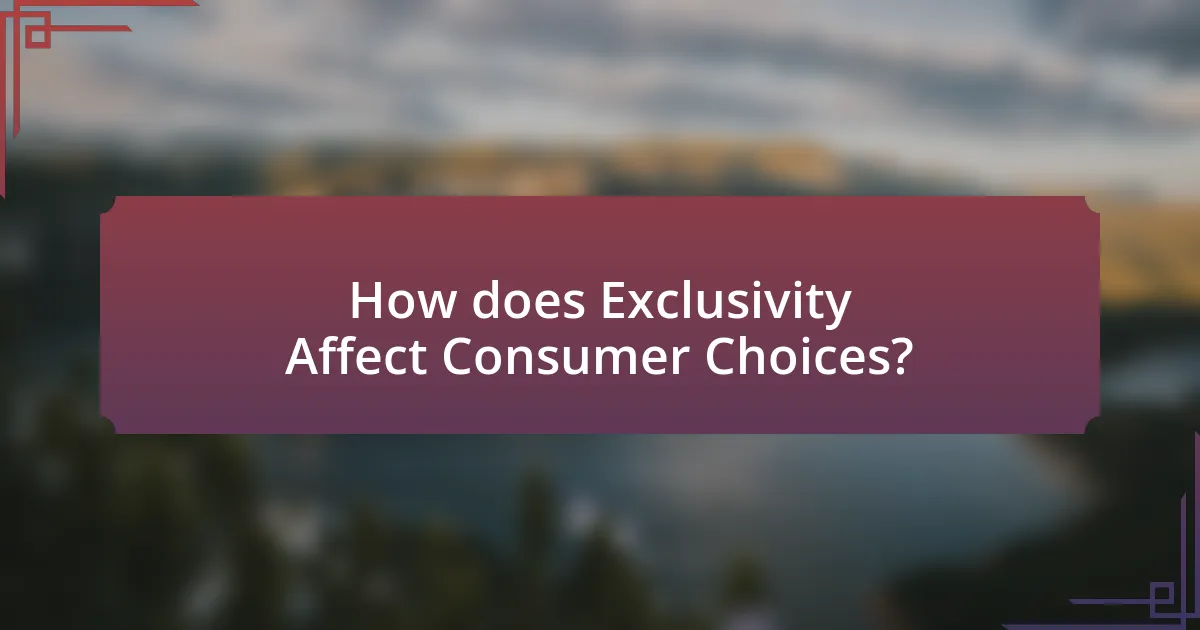
How does Exclusivity Affect Consumer Choices?
Exclusivity significantly influences consumer choices by creating a perception of scarcity and desirability. When products are marketed as exclusive or limited edition, consumers often feel a heightened sense of urgency to purchase, driven by the fear of missing out. Research indicates that limited availability can enhance the perceived value of a product, leading to increased demand; for instance, a study published in the Journal of Consumer Research found that consumers are willing to pay more for items they perceive as scarce. This psychological effect is rooted in the principle of scarcity, which suggests that people assign greater value to things that are less available.
What are the emotional responses associated with purchasing exclusive makeup?
Purchasing exclusive makeup elicits emotional responses such as excitement, validation, and a sense of belonging. Excitement arises from the anticipation of acquiring a unique product that is not widely available, which can enhance feelings of joy and satisfaction. Validation occurs as consumers perceive exclusive makeup as a status symbol, reinforcing their self-esteem and identity within social circles. Additionally, the sense of belonging is fostered through community engagement, as exclusive products often create a shared experience among enthusiasts. Research indicates that limited edition items trigger a fear of missing out (FOMO), further intensifying these emotional responses and driving consumer behavior.
How does the feeling of ownership impact consumer satisfaction?
The feeling of ownership significantly enhances consumer satisfaction by creating a sense of personal investment in a product. When consumers perceive ownership, they often experience increased emotional attachment and value, leading to greater satisfaction with their purchase. Research indicates that ownership can amplify positive feelings towards a product, as demonstrated in a study published in the Journal of Consumer Research, where participants reported higher satisfaction levels with items they felt ownership over compared to those they did not. This psychological phenomenon is particularly relevant in the context of limited edition makeup, where exclusivity heightens the sense of ownership and, consequently, consumer satisfaction.
What role does nostalgia play in the appeal of limited edition products?
Nostalgia significantly enhances the appeal of limited edition products by evoking positive memories and emotions associated with past experiences. This emotional connection can drive consumer behavior, as individuals often seek to recapture feelings of joy or comfort linked to specific moments in their lives. Research indicates that nostalgia can increase consumer willingness to pay for products, as it creates a sense of personal significance and attachment. For instance, a study published in the Journal of Consumer Research found that nostalgic feelings can lead to higher purchase intentions, particularly for items that remind consumers of their childhood or significant life events. Thus, nostalgia serves as a powerful motivator in the marketing of limited edition products, making them more desirable to consumers.
How do consumers perceive value in limited edition makeup?
Consumers perceive value in limited edition makeup primarily through the lens of exclusivity and scarcity. This perception is driven by the belief that limited availability enhances desirability, making the products feel more special and unique. Research indicates that consumers often associate limited edition items with higher quality and status, as evidenced by a study published in the Journal of Consumer Research, which found that scarcity can increase perceived value and consumer demand. Additionally, the emotional connection to owning something rare contributes to a heightened sense of satisfaction and identity, reinforcing the notion that limited edition makeup is not just a product, but a symbol of personal expression and social status.
What factors contribute to the perceived worth of exclusive items?
The perceived worth of exclusive items is primarily influenced by scarcity, social status, and emotional connection. Scarcity creates a sense of urgency and desire, as limited availability often leads to higher demand; for instance, a study by Cialdini (2009) highlights how people value items more when they are perceived as rare. Social status is another significant factor, as owning exclusive items can enhance an individual’s social standing, reinforcing the idea that luxury brands often market their products as symbols of prestige. Additionally, emotional connection plays a crucial role; consumers often associate exclusive items with personal significance or unique experiences, which can elevate their perceived value. These factors collectively contribute to the allure and desirability of exclusive items in the marketplace.
How does exclusivity influence purchasing decisions during sales events?
Exclusivity significantly influences purchasing decisions during sales events by creating a sense of urgency and desirability among consumers. When products are marketed as exclusive or limited edition, they trigger psychological responses that enhance perceived value and encourage immediate purchases. Research indicates that scarcity increases demand; for instance, a study published in the Journal of Consumer Research found that consumers are more likely to buy products labeled as limited in availability, as they fear missing out on unique opportunities. This phenomenon is particularly evident in the beauty industry, where limited edition makeup items often sell out quickly, demonstrating how exclusivity can drive consumer behavior and increase sales during promotional events.
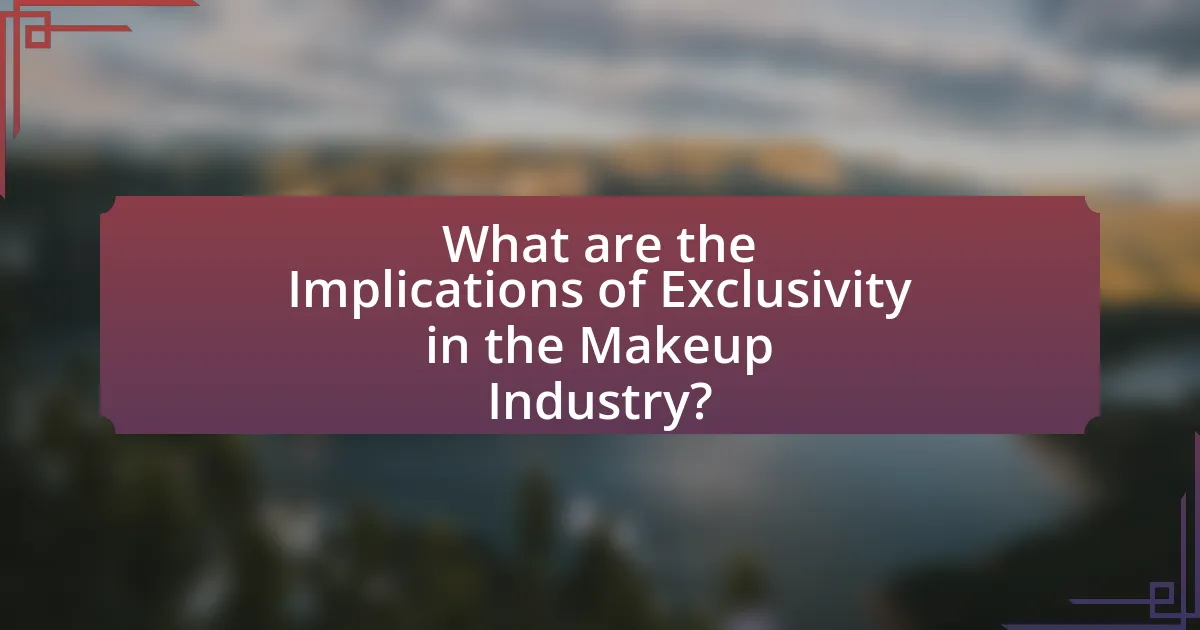
What are the Implications of Exclusivity in the Makeup Industry?
Exclusivity in the makeup industry creates a perception of luxury and desirability, leading to increased consumer demand and brand loyalty. This phenomenon is supported by the scarcity principle in psychology, which suggests that limited availability enhances the perceived value of products. For instance, brands like Chanel and MAC often release limited edition collections that sell out quickly, demonstrating how exclusivity can drive sales and create a sense of urgency among consumers. Additionally, exclusivity can foster a community among consumers who share a passion for rare products, further solidifying brand allegiance and enhancing the overall consumer experience.
How does the trend of limited edition releases affect brand reputation?
The trend of limited edition releases positively affects brand reputation by enhancing perceived exclusivity and desirability. Brands that offer limited edition products often create a sense of urgency among consumers, leading to increased demand and heightened brand loyalty. For instance, a study by the Journal of Consumer Research found that consumers are more likely to purchase products perceived as scarce, which reinforces the brand’s image as desirable and prestigious. This strategy not only attracts new customers but also strengthens the emotional connection existing customers have with the brand, ultimately elevating its overall reputation in the marketplace.
What risks do brands face when over-releasing exclusive products?
Brands face significant risks when over-releasing exclusive products, primarily the dilution of brand value and consumer trust. When exclusive items are released too frequently, the perceived rarity and desirability diminish, leading to a potential decrease in consumer interest and loyalty. For instance, a study by the Journal of Consumer Research indicates that scarcity enhances value perception; thus, excessive availability can undermine this psychological principle. Additionally, over-releasing can lead to inventory issues, where unsold products may necessitate discounts, further eroding brand prestige. This pattern can create a cycle where consumers no longer view the brand as exclusive, ultimately harming long-term profitability and market positioning.
How can brands balance exclusivity with accessibility?
Brands can balance exclusivity with accessibility by implementing tiered product offerings that cater to different consumer segments. This strategy allows brands to create limited edition items that evoke a sense of exclusivity while also providing more accessible options that maintain brand identity. For instance, luxury brands often release exclusive collections alongside more affordable lines, ensuring that a broader audience can engage with the brand. Research indicates that 70% of consumers are attracted to brands that offer both exclusive and accessible products, as it enhances their perception of value and desirability.
What are the long-term effects of exclusivity on consumer behavior?
The long-term effects of exclusivity on consumer behavior include increased brand loyalty and a heightened perception of value. Consumers often develop a strong emotional attachment to exclusive products, leading to repeat purchases and advocacy for the brand. Research indicates that exclusivity can create a sense of belonging and status among consumers, which reinforces their commitment to the brand over time. For instance, a study published in the Journal of Consumer Research found that consumers who perceive a product as exclusive are more likely to exhibit brand loyalty and willingness to pay a premium price, demonstrating the lasting impact of exclusivity on purchasing decisions.
How does the desire for exclusivity evolve over time?
The desire for exclusivity evolves over time as societal values and consumer behaviors shift, influenced by factors such as cultural trends, economic conditions, and technological advancements. Initially, exclusivity may stem from a need for social status, where limited availability of products signifies wealth or prestige. As markets become saturated and consumer awareness increases, the desire for exclusivity can transform into a pursuit of individuality and personal expression. For example, the rise of social media has amplified the appeal of unique, limited-edition items, as consumers seek to differentiate themselves in a crowded digital landscape. This evolution is supported by research indicating that consumers increasingly associate exclusivity with authenticity and personal identity, leading brands to strategically release limited editions to cater to this changing desire.
What strategies can brands implement to maintain consumer interest?
Brands can maintain consumer interest by leveraging exclusivity through limited edition releases. This strategy taps into the psychological principle of scarcity, where consumers perceive limited availability as more desirable. For instance, a study published in the Journal of Consumer Research found that products marketed as scarce lead to increased demand and consumer engagement. By regularly introducing exclusive collections or collaborations, brands can create a sense of urgency and excitement, encouraging consumers to act quickly to secure their purchases. Additionally, engaging consumers through personalized marketing and loyalty programs can further enhance their connection to the brand, fostering long-term interest and repeat purchases.
What are some best practices for consumers when purchasing limited edition makeup?
Consumers should research the brand and product before purchasing limited edition makeup to ensure authenticity and quality. This involves checking reviews, ingredient lists, and brand reputation. Additionally, consumers should set a budget to avoid overspending due to the urgency often associated with limited editions. According to a study published in the Journal of Consumer Research, scarcity can lead to impulsive buying behavior, making it crucial for consumers to remain mindful of their financial limits. Lastly, consumers should consider purchasing from reputable retailers to avoid counterfeit products, as the prevalence of fakes increases with limited edition releases.
How can consumers make informed decisions about exclusive products?
Consumers can make informed decisions about exclusive products by researching product details, understanding market trends, and evaluating brand reputation. Researching product details involves examining ingredients, benefits, and potential drawbacks, which can be found on official brand websites or trusted beauty platforms. Understanding market trends helps consumers recognize the value and demand for limited edition items, as evidenced by the growing popularity of exclusive makeup releases, which often sell out quickly. Evaluating brand reputation is crucial; brands with a history of quality and customer satisfaction are more likely to deliver on their promises, as shown by consumer reviews and ratings on platforms like Sephora and Ulta.
What tips can help consumers avoid impulse buying in the beauty market?
To avoid impulse buying in the beauty market, consumers should implement strategies such as creating a budget, making a shopping list, and waiting 24 hours before making a purchase. Establishing a budget helps consumers limit their spending, while a shopping list ensures they only buy necessary items. The 24-hour waiting period allows time for reflection, reducing the likelihood of regretful purchases. Research indicates that consumers who engage in these practices are less likely to experience buyer’s remorse and can make more informed decisions, ultimately leading to more satisfying purchases.
